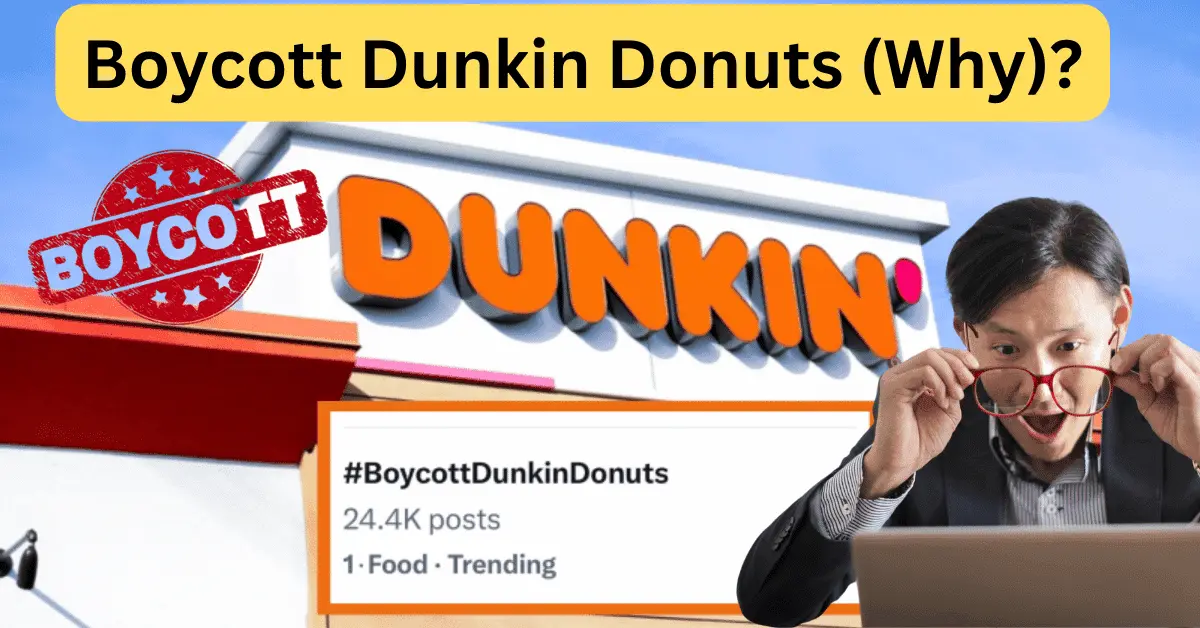‘Dunkin’ Donuts Boycott: The Controversy Explained and What It Means for Consumers
In recent months, Dunkin’ Donuts, one of America’s most beloved coffee and donut chains, has found itself at the center of a growing boycott movement. This backlash, which started with a series of social media posts, has rapidly gained traction, leading to widespread calls for consumers to avoid the brand. But what triggered this controversy, and what does it mean for Dunkin’ Donuts and its loyal customers?
The Origins of the Boycott
The Dunkin’ Donuts boycott began in early 2024, fueled by allegations that the company was engaging in practices that many deemed unethical. The controversy was sparked by a report from a well-known environmental advocacy group, which accused Dunkin’ Donuts of sourcing coffee beans from suppliers involved in deforestation and poor labor practices. According to the report, these suppliers were contributing to significant environmental damage in coffee-growing regions, as well as exploiting workers by paying them below minimum wage and subjecting them to unsafe working conditions.
As the report circulated on social media, it quickly caught the attention of environmental activists, labor rights organizations, and socially conscious consumers. Hashtags such as #BoycottDunkin and #StandUpForCoffeeWorkers started trending, with thousands of users sharing their concerns and calling for a boycott of Dunkin’ Donuts products.
The Company’s Response
Dunkin’ Donuts initially responded to the allegations with a brief statement, denying any wrongdoing and asserting that the company was committed to ethical sourcing practices. The company emphasized that it adheres to strict guidelines when selecting suppliers and that it was taking steps to investigate the claims.
However, many consumers and advocacy groups were not satisfied with this response, viewing it as insufficient and lacking transparency. The backlash intensified, with some calling for a more detailed explanation and concrete actions from Dunkin’ Donuts to address the issues raised.
Escalation of the Boycott
As the boycott gained momentum, several high-profile figures, including celebrities and politicians, publicly supported the movement. This increased visibility led to even more people joining the boycott, and soon, it began to impact Dunkin’ Donuts’ sales. Reports surfaced that some Dunkin’ Donuts locations were experiencing a noticeable drop in foot traffic, while others saw a decline in their coffee and donut sales.
In response to the escalating situation, Dunkin’ Donuts released a more comprehensive statement, outlining a series of measures the company planned to implement. These included a commitment to source 100% of its coffee beans from certified fair trade and environmentally sustainable suppliers by the end of 2024. The company also pledged to conduct an independent audit of its supply chain and to increase transparency in its sourcing practices.
Despite these promises, the boycott has continued, with many consumers expressing skepticism about the company’s ability to follow through on its commitments. Some have pointed to past incidents where companies made similar promises but failed to deliver meaningful change.
The Impact on Dunkin’ Donuts
The ongoing boycott poses significant challenges for Dunkin’ Donuts. The company, which operates thousands of locations across the United States and internationally, is highly dependent on its reputation as a provider of affordable, high-quality coffee and baked goods. If the boycott continues to grow, it could lead to a sustained decline in sales, particularly among younger, socially conscious consumers who are more likely to support such movements.
Moreover, the boycott has already started to affect Dunkin’ Donuts’ brand image. The company, which has long marketed itself as a friendly, community-oriented brand, now faces accusations of contributing to environmental harm and labor exploitation. These allegations, if not adequately addressed, could result in lasting damage to the brand’s reputation.
What This Means for Consumers
For consumers, the Dunkin’ Donuts boycott raises important questions about the ethics of everyday purchases. As more people become aware of the impact that their spending habits can have on global supply chains, there is growing pressure on companies to operate in a socially and environmentally responsible manner.
This boycott also highlights the power of collective action in driving change. The rapid spread of the #BoycottDunkin movement on social media demonstrates how quickly consumers can mobilize around issues they care about and how companies are increasingly being held accountable for their practices.
Moving Forward: What Can Dunkin’ Donuts Do?
To resolve the situation and restore consumer trust, Dunkin’ Donuts will need to take significant steps beyond its initial promises. Transparency will be key—consumers are likely to demand regular updates on the company’s progress toward meeting its ethical sourcing goals. Additionally, Dunkin’ Donuts may need to engage directly with critics, including environmental and labor rights groups, to demonstrate its commitment to meaningful change.
The company could also consider launching new initiatives aimed at improving sustainability and worker rights within its supply chain. These efforts could include investing in fair trade programs, supporting reforestation projects in coffee-growing regions, and ensuring that workers in its supply chain receive fair wages and safe working conditions.
Finally, Dunkin’ Donuts might benefit from engaging in a broader conversation about corporate responsibility. By participating in industry-wide efforts to improve sourcing practices and by advocating for stronger regulations on environmental and labor issues, the company could position itself as a leader in ethical business practices.
Conclusion
The Dunkin’ Donuts boycott is a stark reminder of the growing importance of ethical consumerism. As consumers become more informed about the impact of their purchases, companies are under increasing pressure to ensure that their products are not only high quality but also responsibly sourced. For Dunkin’ Donuts, the path forward will require transparency, accountability, and a genuine commitment to change. Whether the company can successfully navigate this crisis remains to be seen, but one thing is clear: in today’s interconnected world, consumers are more powerful than ever, and their voices can drive significant change.
